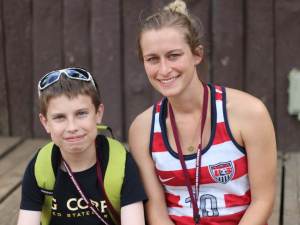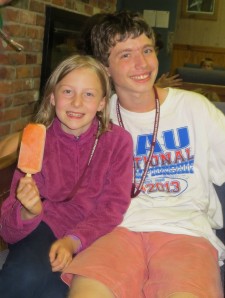Does your gifted child like to spend recess alone? Does she only have one or two friends? Does he have one very intense friendship? Does she only have friends that are significantly older or younger than she is? Does he only make friends in his extracurricular activities rather than at school?
These are common behaviors of gifted children, and it is not unusual that parents of gifted children have concerns about their child’s friendships. Gifted individuals possess a unique combination of characteristics that can influence how and why they establish friendships.
The gifted child may only have one or two friends, but they will likely be very deep friendships.
 Gifted kids may have an extremely close connection to one or two people rather than a large group of friends. This is okay. It does become a problem, however, when there is a falling out with one of these very close friends, which can cause great distress in a gifted child. It is important to be sensitive to this, to help your child navigate through this difficult experience, and to help him or her understand that there are other friends out there.
Gifted kids may have an extremely close connection to one or two people rather than a large group of friends. This is okay. It does become a problem, however, when there is a falling out with one of these very close friends, which can cause great distress in a gifted child. It is important to be sensitive to this, to help your child navigate through this difficult experience, and to help him or her understand that there are other friends out there.
Additionally, the gifted child’s friendships are often extremely meaningful and deep. A study by Miraca U. M. Gross found that hierarchical stages of friendship and what a child looks for and requires in a friend develops based on mental age, rather than chronological age, especially in the early years. Gifted children look for others with whom they can relate on a deeper level, and they feel more intensely than their non-gifted peers.
The gifted child will often make friends with others much older than he or she.
 Gifted children look for intellectual peers. If there are no kids their age who are on a similar intellectual level, they often tend towards making friendships with older kids, who have more knowledge and life experience than that of their age peers.
Gifted children look for intellectual peers. If there are no kids their age who are on a similar intellectual level, they often tend towards making friendships with older kids, who have more knowledge and life experience than that of their age peers.
As Jim Delisle says in Parenting Gifted Kids: Tips for Raising Happy and Successful Children, “Gifted children often prefer the company of adults or older children. The reason is obvious: They don’t need to explain who they are or how they know what they know. Accepted as bright, competent individuals, the stigma of being smart is not a stigma at all” (22).
Additionally, the aforementioned study by Gross indicates that your gifted child’s expectations of friendship may differ from his or her chronological peers, making it difficult to connect on that deeper level gifted children crave. In addition to seeking out older children as friends because they are mental age peers, the study suggests that gifted children “may also be looking for children whose conceptions and expectations of friendship are similar to their own.”
Activities of interest to your gifted child that combine children of different ages can be an excellent place for him or her to develop friendships.
The gifted child may also make friends with others much younger than he or she.
 To the gifted child that does not find many chronological peers at his or her intellectual level, younger children are often satisfying companions. Younger children are not supposed to be on the same intellectual level as them, so gifted children understand why younger children are different intellectually. This friendship will often take shape as that of a mentor/mentee relationship, with the gifted child acting as a role model for the younger child.
To the gifted child that does not find many chronological peers at his or her intellectual level, younger children are often satisfying companions. Younger children are not supposed to be on the same intellectual level as them, so gifted children understand why younger children are different intellectually. This friendship will often take shape as that of a mentor/mentee relationship, with the gifted child acting as a role model for the younger child.
Gifted children need intellectual peers.
 Stuck in a classroom based on their chronological age rather than intellectual or academic level, gifted children often struggle to form connections with their classmates. Additionally, they think differently and have different interests than their classmates; the lack of commonality can create an even wider divide. If your child cannot find intellectual peers at school, enroll him or her in activities that lend themselves to interaction across a wider age group or activities with other intellectually advanced kids.
Stuck in a classroom based on their chronological age rather than intellectual or academic level, gifted children often struggle to form connections with their classmates. Additionally, they think differently and have different interests than their classmates; the lack of commonality can create an even wider divide. If your child cannot find intellectual peers at school, enroll him or her in activities that lend themselves to interaction across a wider age group or activities with other intellectually advanced kids.
Gifted children need to spend time with other gifted children.
 It is important for your child to understand that he or she is different from most kids of the same age, but it is equally important to know that there are other kids out there like him or her. Knowing they are not alone really helps gifted kids. Try to find a program or group for gifted kids that your child can attend, like IEA’s programs, even if it is only in the summer. If there are no appropriate local or in-person opportunities available, the internet and technology make it much easier for our gifted kids to connect with each other despite geographic separation.
It is important for your child to understand that he or she is different from most kids of the same age, but it is equally important to know that there are other kids out there like him or her. Knowing they are not alone really helps gifted kids. Try to find a program or group for gifted kids that your child can attend, like IEA’s programs, even if it is only in the summer. If there are no appropriate local or in-person opportunities available, the internet and technology make it much easier for our gifted kids to connect with each other despite geographic separation.
Friendship is an important need for both children and adults. It is the primary catalyst for children learning to develop and grow their social self. To a gifted child, however, friendship is different, and it is important to recognize these differences. Understanding your gifted child’s social needs can help avoid misinterpreting their behavior (“Why does my child only have one or two friends?”) and can help your child build new friendships and nurture existing ones.
Want more information about gifted children? Sign up for our e-newsletter to get articles and resources pertaining to gifted youth in your inbox.
This post is part of the Hoagies’ Gifted Education Page August Blog Hop on Gifted Friendships. Check out all of the other great blogs participating in Hoagies’ August Blog Hop here.

